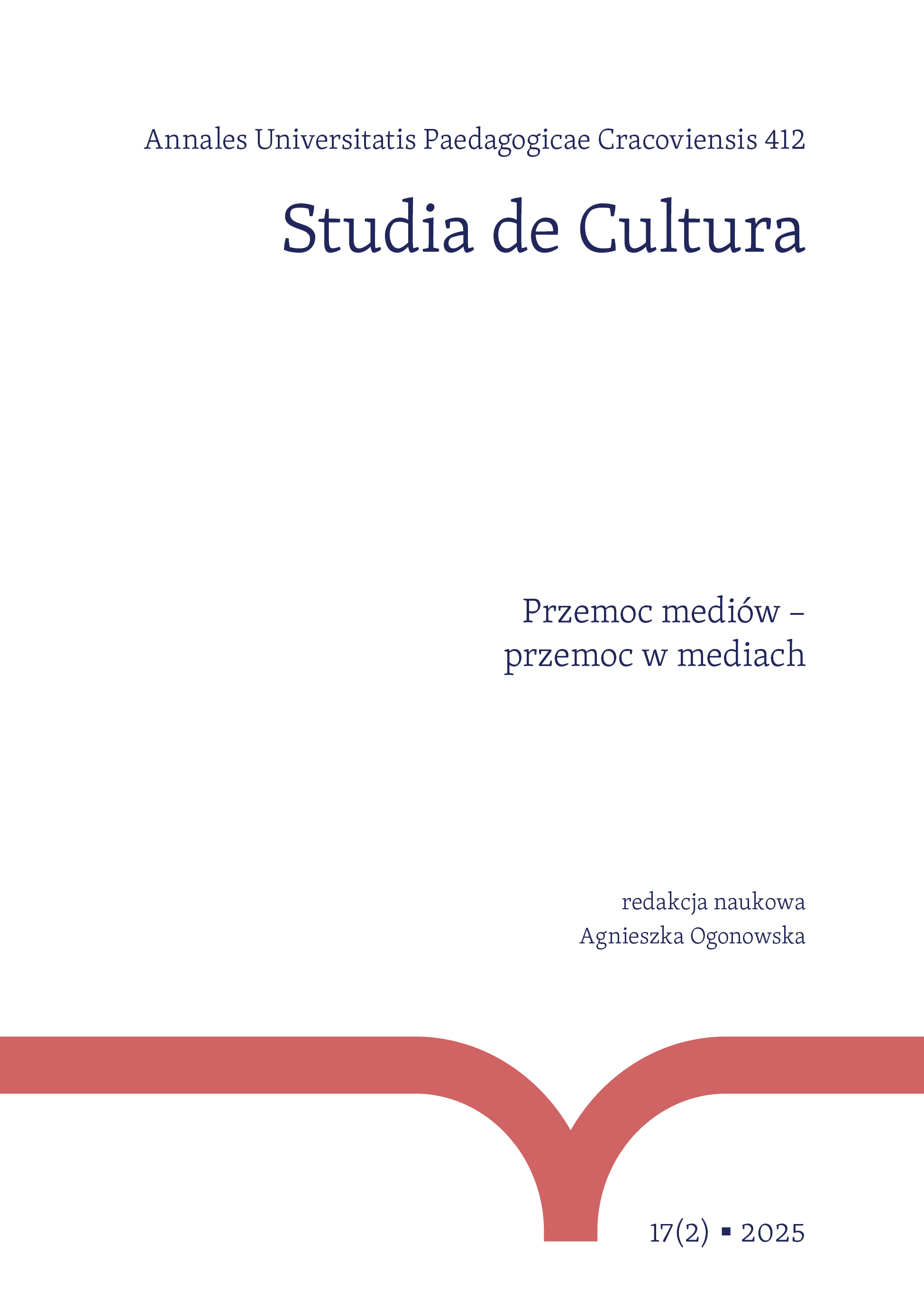Abstrakt
This study aims to analyse the narratives of Russian pro- government Telegram channels that normalise war and justify violence, focusing on their cultural- civilisational foundations and impact on public consciousness. The material consists of user comments collected from open discussions on these channels, which serve as echo chambers. The study’s methodological framework includes critical discourse analysis to identify key narratives and lexical markers, along with a cultural- civilisational approach to interpret the militaristic and dehumanising elements of the discourse.
Bibliografia
Bahador Babak. 2012. Rehumanizing Enemy Images: Media Framing From War to Peace. In: Forming a Culture of Peace: Reframing Narratives of Intergroup Relations, Equity, and Justice. Karina Korostelina (ed.). New York. 195–211.
Zobacz w Google Scholar
Davydov Aleksey. 2003. “Budet li Rossiya voyevat’ v XX i veke?.” Rossiya reformiruyushchayasya 3. 484–496.
Zobacz w Google Scholar
Diaz Ruiz Carlos, Nilsson Tomas. 2023. “Disinformation and Echo Chambers: How Disinformation Circulates on Social Media Through Identity- Driven Controversies.” Journal of Public Policy & Marketing vol. 42(1). 18–35.
Zobacz w Google Scholar
Gaufman Elizaveta. 2017. Security Threats and Public Perception. Coventry.
Zobacz w Google Scholar
Harel Tal Orian, Jameson Jessica Katz, Maoz Ifat. 2020. “The Normalization of Hatred: Identity, Affective Polarization, and Dehumanization on Facebook in the Context of Intractable Political Conflict.” Social Media + Society vol. 6(2). 1–10.
Zobacz w Google Scholar
How Many Users Does Telegram Have. 2024. World Population Review. https://worldpopulationreview.com/country-rankings/telegram-users-by-country (access: 26.11.2024).
Zobacz w Google Scholar
Leszczak Oleg, Stefański Ryszard. 2022. Wojna w Ukrainie jako konflikt cywilizacyjny. Kielce. https://www.youtube.com/watch?v=H3jBO2CLQrk (access: 26.11.2024).
Zobacz w Google Scholar
Leszczak Oleg, Stefański Ryszard. 2024. Modele (systemy) kulturowo- cywilizacyjne. Księga 1. Kielce.
Zobacz w Google Scholar
Leszczak Oleg. 2014. Rosyjski etniczny obraz świata w aspekcie kulturowo- cywilizacyjnym i lingwosemiotycznym. Toruń.
Zobacz w Google Scholar
Löblich, Maria, Venema Niklas. 2021. Echo Chambers: A Further Dystopia of Media Generated Fragmentation. In: Digital Roots: Historicizing Media and Communication Concepts of the Digital Age. Gabriele Balbi et al. (eds.). Berlin–Boston. 177–192.
Zobacz w Google Scholar
Mann Michael. 1987. “The Roots and Contradictions of Modern Militarism.” New Left Review vol. 162(2). 27–55.
Zobacz w Google Scholar
Mullen Brian, Leader Tirza. 2005. Linguistic Factors: Antilocutions, Ethnonyms, Ethnophaulisms, and Other Varieties of Hate Speech. In: On the Nature of Prejudice: Fifty Years After Allport. John F. Dovidio, Peter Glick, Laurie A. Rudman (eds.). 192–207.
Zobacz w Google Scholar
Mutschler Max M., Bales Marius. 2020. Global Militarisation Index 2020. Bonn.
Zobacz w Google Scholar
Nielsen Rasmus Kleis, Ganter Sarah Anne. 2022. The Power of Platforms: Shaping Media and Society. Oxford.
Zobacz w Google Scholar
Olzacka Elżbieta. 2017. Wojna na Facebooku. Rola przedstawień wizualnych w “militaryzacji” mediów społecznościowych na przykładzie konfliktu na wschodniej Ukrainie. In: Czy obrazy rządzą ludźmi? Agnieszka Kampka, Anna Kiryjow, Katarzyna Sobczak (eds.). Warszawa. 62–75.
Zobacz w Google Scholar
Rieber Robert W., Kelly Robert J. 1999. Substance and Shadow: Images of the Enemy. In: The Psychology of War and Peace: The Image of the Enemy. Robert W. Rieber (ed.). New York. 3–39.
Zobacz w Google Scholar
Thomas Laiby, Bhat Subramanya. 2022. “A Comprehensive Overview of Telegram Services-A Case Study.” International Journal of Case Studies in Business, IT and Education vol. 6(1). 288–301.
Zobacz w Google Scholar
Vagts Alfred. 1959. A History of Militarism: Civilian and Military. New York.
Zobacz w Google Scholar
Vanetik Natalia et al. 2023. Propaganda Detection in Russian Telegram Posts in the Scope of the Russian Invasion of Ukraine. In: Proceedings of the 14th International Conference on Recent Advances in Natural Language Processing. Galia Angelova, Maria Kunilovskaya, Ruslan Mitkov (eds.). Varna. 1162–1170.
Zobacz w Google Scholar
Wahlstrom Riitta. 1992. The Challenge of Peace Education: Replacing Cultures of Militarism. In: New Agendas for Peace Research: Conflict and Security Re- Examined. Elise Boulding (ed.). Boulder. 171–184.
Zobacz w Google Scholar
Wincław Dawid. 2016. “Obcy czy po prostu Inny? Wybrane etyczne aspekty dehumanizacji.” Kultura i Wartości vol. 19. 93–115.
Zobacz w Google Scholar
Yuval- Davis Nira. 2010. “Theorizing Identity: Beyond the ‘Us’ and ‘Them’ Dichotomy.” Patterns of Prejudice vol. 44(3). 261–280.
Zobacz w Google Scholar
“Russia Today.” https://t.me/rt_russian (access: 20.11.2024).
Zobacz w Google Scholar
“Operatsiya Z: Voyenkory Russkoy Vesny.” https://t.me/RVvoenkor (access: 20.11.2024).
Zobacz w Google Scholar
“Ran’she vsekh. Nu pochti.” https://t.me/bbbreaking (access: 20.11.2024).
Zobacz w Google Scholar
“Tsar’grad.” https://t.me/tsargradtv (access: 20.11.2024).
Zobacz w Google Scholar

Utwór dostępny jest na licencji Creative Commons Uznanie autorstwa – Użycie niekomercyjne 4.0 Międzynarodowe.
Prawa autorskie (c) 2025 Annales Universitatis Paedagogicae Cracoviensis | Studia de Cultura

